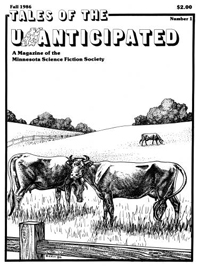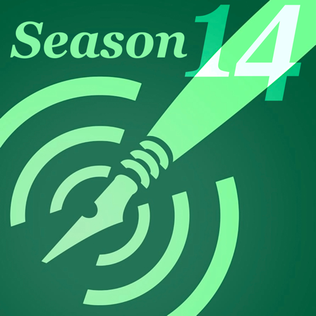
Baen Books is an American publishing house for science fiction and fantasy. In science fiction, it emphasizes space opera, hard science fiction, and military science fiction. The company was established in 1983 by science fiction publisher and editor Jim Baen. After his death in 2006, he was succeeded as publisher by long-time executive editor Toni Weisskopf.
The Internet Speculative Fiction Database (ISFDB) is a database of bibliographic information on genres considered speculative fiction, including science fiction and related genres such as fantasy, alternate history, and horror fiction. The ISFDB is a volunteer effort, with the database being open for moderated editing and user contributions, and a wiki that allows the database editors to coordinate with each other. As of April 2022, the site had catalogued 2,002,324 story titles from 232,816 authors.

Eric Flint was an American author, editor, and e-publisher. The majority of his works are alternate history science fiction, but he also wrote humorous fantasy adventures. His works have been listed on The New York Times, The Wall Street Journal, The Washington Post, and Locus magazine best seller lists. He was a co-founder and editor of the Baen Free Library.

Linwood Vrooman Carter was an American author of science fiction and fantasy, as well as an editor, poet and critic. He usually wrote as Lin Carter; known pseudonyms include H. P. Lowcraft and Grail Undwin. He is best known for his work in the 1970s as editor of the Ballantine Adult Fantasy series, which introduced readers to many overlooked classics of the fantasy genre.

A science fiction magazine is a publication that offers primarily science fiction, either in a hard-copy periodical format or on the Internet. Science fiction magazines traditionally featured speculative fiction in short story, novelette, novella or novel form, a format that continues into the present day. Many also contain editorials, book reviews or articles, and some also include stories in the fantasy and horror genres.

A fantasy fiction magazine, or fantasy magazine, is a magazine which publishes primarily fantasy fiction. Not generally included in the category are magazines for children with stories about such characters as Santa Claus. Also not included are adult magazines about sexual fantasy. Many fantasy magazines, in addition to fiction, have other features such as art, cartoons, reviews, or letters from readers. Some fantasy magazines also publish science fiction and horror fiction, so there is not always a clear distinction between a fantasy magazine and a science fiction magazine. For example, Fantastic magazine published almost exclusively science fiction for much of its run.

InterGalactic Medicine Show was an American online fantasy and science fiction magazine. It was founded in 2005 by multiple award-winning author Orson Scott Card and was edited by Edmund R. Schubert from 2006–2016, after which Scott Roberts took over. It was originally biannual, but became quarterly in 2008 and bimonthly in 2009, except for a brief hiatus in 2010. The magazine ceased publication in June 2019.

Leading Edge, formerly The Leading Edge Magazine of Science Fiction and Fantasy, is a semi-professional speculative fiction magazine first published in April 1981 and published at Brigham Young University in Provo, Utah. The magazine is known for its high quality fiction and has published stories by authors such as Dave Wolverton, M. Shayne Bell, Dan Wells, and Orson Scott Card, articles by Algis Budrys, as well as poetry and articles by poet and literary critic Michael R. Collings. Several former Leading Edge staff members have become speculative fiction authors in their own right. Other notable former staff members include Anne Sowards, senior editor at Roc Books and Ace Books, and literary agent Michael Carr.

Solaris Books is an imprint which focuses on publishing science fiction, fantasy and dark fantasy novels and anthologies. The range includes titles by both established and new authors. The range is owned by Rebellion Developments and distributed to the UK and US booktrade via local divisions of Simon & Schuster.

Jim Baen's Universe (JBU) was a bimonthly online fantasy and science fiction magazine created by Jim Baen. It was recognized by the SFWA as a Qualifying Short Fiction Venue. JBU began soliciting materials in January 2006 and launched in June 2006. The magazine contained around 120,000 to 150,000 words per issue. It closed in 2010.
Nir Yaniv is an Israeli multidisciplinary artist.

M. K. Hobson is an American speculative fiction and fantasy writer. In 2003 she was a Pushcart Prize nominee, and her debut novel The Native Star was nominated for the 2010 Nebula Award. She lives in Oregon City, Oregon.

Tales of the Unanticipated, known as TOTU, is a semiprozine that was founded under the auspices of the Minnesota Science Fiction Society, and has since become independent. Like contemporaries such as Crank! and Century, Tales of the Unanticipated strove from its inception to showcase fiction, poetry and articles that are ostensibly speculative fiction.

Mary Robinette Kowal is an American author and puppeteer. Originally a puppeteer by primary trade after receiving a bachelor's degree in art education, she became art director for science fiction magazines and by 2010 was also authoring her first full-length published novels. The majority of her work is characterized by science fiction themes, such as interplanetary travel; a common element present in many of her novels is historical or alternate history fantasy, such as in her Glamourist Histories and Lady Astronaut books.
Electric Velocipede was a small press speculative fiction fan magazine edited by John Klima. Published from 2001 to 2013, Electric Velocipede won the Hugo Award for Best Fanzine in 2009.
The role of women in speculative fiction has changed a great deal since the early to mid-20th century. There are several aspects to women's roles, including their participation as authors of speculative fiction and their role in science fiction fandom. Regarding authorship, in 1948, 10–15% of science fiction writers were female. Women's role in speculative fiction has grown since then, and in 1999, women comprised 36% of the Science Fiction and Fantasy Writers of America's professional members. Frankenstein (1818) by Mary Shelley has been called the first science fiction novel, although women wrote utopian novels even before that, with Margaret Cavendish publishing the first in the seventeenth century. Early published fantasy was written by and for any gender. However, speculative fiction, with science fiction in particular, has traditionally been viewed as a male-oriented genre.

Writing Excuses is a podcast hosted by authors Dan Wells, Brandon Sanderson, Mary Robinette Kowal, and author and web cartoonist Howard Tayler.

Redstone Science Fiction was an online science fiction magazine. The first issue was published June 1, 2010 and maintained a regular monthly schedule until the September 1, 2012 issue.
Abyss & Apex Magazine (A&A) is a long-running, semi-pro online speculative fiction magazine. The title of the zine comes from a quote by Friedrich Nietzsche (1844-1900), "And if you gaze long into the abyss, the abyss gazes also into you." The stories and poetry therefore follow the pattern of "how would humans react?" if a new technology or a type of magic or supernatural power affected them.

Michael Damian Thomas is an American magazine editor and podcaster. Thomas has won eight Hugo Awards, a British Fantasy Award, and a Parsec Award as co-publisher and co-editor-in-chief of Uncanny Magazine with his wife, Lynne M. Thomas. He has also been active as an advocate for disabled children in Illinois.















